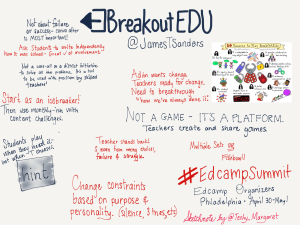September 21 was the International Day of Peace as designated by the United Nations. I have been honored since June to participate in a group of educators who broadcast monthly via the Periscope app using the hashtag #passthescopeedu. Typically these broadcasts are 5-7 minute "pocket PD sessions", or expressions of inspiration on topics like "Global Connections", "What Is Your Creative Mojo", "Succeed Together", and "I Know What You Did This Summer - How Will You Implement Your Summer PD Learning?".
Sometime over the summer it occurred to me (as random things often do) that the International Day of Peace might be a really great theme for s #passthescopeedu edition. I suggested it to the group, and the idea was accepted wholeheartedly. Over the next several weeks the regular participants reached out to colleagues local (which covers the US) and international.
What transpired yesterday far surpassed my hopes, and consisted of some truly inspiring messages of Peace from students, educators and others around the world. What was utterly fascinating and eye-opening was the number of different angles to peace that were explored. Along the path of preparation, I fielded questions from several colleagues regarding what exactly would be an appropriate way to scope a message of peace. My initial concept was to keep it as broad as possible, allowing for performance, art, poetry, more traditional presentations, or other ideas that people felt could tie in.
Valerie Lewis compiled this
storify of the day's event, but there is a synopsis below.
Matt Frattali (most often known as Matt Frat) posed the idea that Campaign Finance Reform is an obvious road to peace. He made a compelling argument on several fronts, and waved the flag to rally educators to take action for change.
Cassie Reeder enthusiastically spoke to the power of global connections as a way to promote peace even with our youngest students. As a World Language teacher and an educator who has been more and more actively seeking to connect my students with their peers around the globe, I really appreciated her presentation.
Valerie Lewis, a Georgia educator, is considered by most of us in #passthescopeedu to be the driving force behind us all (not to neglect
Derek Larson, Toutoule Ntoya, whose scope will be mentioned later in this post, and the aforementioned Stacy Lovdahl who are huge parts of the #passthescopeedu team). She brought student voice to the stage with her International and Peace Clubs, as they gave their personal thoughts on peace. In a similarly-themed scope,
Nicolette James had students from the National Honor Society and LGBT Club in her Long Island school share some very powerful personal messages and solutions.
Judy Arzt is easily the most prolific scoper I follow. She broadcasts from many different places around the country (Old Sturbridge Village!!!) and gives in-depth historical and cultural information to her viewers. I loved her take on peace, because she gave background information on about a dozen or so former winners of the Nobel Peace and their accomplishments. She was able to provide a historical context for peace that I had not seen in other scopes - yet another layer!
Barbara Cotter was one educator who brought student voice in the form of song, as she scoped from Micoud Primary in St. Lucia. The multi-talented
Dene Gainey did the same from his classroom, and several French students in my school shared
Fabiana Casella in Argentina gave her personal thoughts on peace and love and their connection, and James and Miriam broadcast similar sentiments from their current home in Georgia, though they hail from the island of Haiti.
Kimberly Howell spoke about connecting children's literature to teach social justice, while
Stacy Lovdahl facilitated a conversation with a very knowledgeable and articulate group of high school seniors about connections they had made to current issues of social justice and various books they had read. One of my
Spanish 3 classes shared a project we have been working on with
Matone de Chiwit on the issue of water scarcity in Latin America. Fabulous connections between content, social justice, and the theme of peace.
Brian Romero Smith also involved his students, using Digital Citizenship as an overarching theme. Without calling it Digital Citizenship,
Sarah Thomas drove home the point that we all need to be cognizant of the images of our children - particularly our children of color - that we post, repost, favorite, like or otherwise endorse on social media. #trendthepositive is a great message for adult Digital Citizens as well as our students.
Toutoule Ntoya expanded on a conversation that started in a Voxer group, and discussed the impact of colonialism on language and culture in the francophone African diaspora. As a French teacher, this was one of my favorite sessions, along with being an issue that I love discussing with my students.
Rachel Pierson had a group of 6th graders speak directly to the United Nations Sustainable Development Goals, particularly apropos given the origin of Peace Day.
Venus Miller, a Family and Psychiatric Nurse Practitioner from Homestead, FL spoke about the intersection of mental illness and domestic violence, and the need for vigilance.
Ashaala Shanae, a Brooklyn-born singer, songwriter, and motivational speaker, directly addressed issues of racism and oppression of African Americans - specifically black men.
The breadth and depth of the perspectives shared was absolutely stunning. The coming together of such a diverse group of international voices with the unified message of peace is something that will stay with me for quite a long time, and something I hope to repeat next year.
So my challenge to you, is to make a plan to add
your voice and your personal message of peace to the chorus next year. We truly can be the change, but only if we take that first step.



